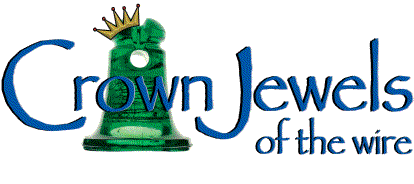Foreign Insulators
by Marilyn Albers
Reprinted from "INSULATORS - Crown Jewels of the Wire", January 1981, page 4
Insulators from Pakistan
Thanks to Ross Huth (Atascadero,
California) I'm able to show you some porcelain insulators from Pakistan this
month. Ross sent this picture of them along with some sketches of their
underglaze ink markings. Starting with the insulator on the far left and
numbering 1-6 the following markings are to be found on them: (Ross did such a
good job I will reproduce his sketches exactly as he sent them to me, reduced
50%.)



Neither of us knows the meanings of all of the markings, but I
think it's pretty evident that Pakistan relies on insulators imported from other
countries rather than manufacturing its own. The ones marked "Made in
Japan" come as no surprise, since Japan is 4th in line after the U.S., the
United Kingdom and West Germany as a chief source of Pakistanian imports.
PAK
stands for Pakistan. The P & T means POSTS and TELEGRAPHS, while T & T
means TELEGRAPHS and TELEPHONES. (Should you ever see P T T on an insulator,
that is for POSTS, TELEGRAPHS and TELEPHONES.) So we must assume that insulators
#1, #2, #4 and #5 were intended for use in telecommunications. The dates on
these also indicate that they are of relatively recent manufacture. The words LA
CLAIRE, SINAR, SETO, etc. are undoubtedly either the manufacturers or the users.
Can you readers help us out here? Ross had 2 of #6, so thanks to his generosity
one of them is now in my collection. He has this to say about how he came to
acquire (quote) the two mushroom shaped beauties - #3 and #4:
"Several years back we were host family for a Cal Poly student (California
State Polytechnic College at San Luis Obispo -- no wonder he shortened it) from
Pakistan, and over a period of four years he made two trips back home to
Karachi, a city on the southern coast of West Pakistan and right on the Arabian
Sea. He brought us several gifts each time, and mine were always insulators.
"The other four were given to me by a school teacher friend and his wife
who spent two years in Pakistan on a teaching project (1976-78). One weekend
while driving around in the country near Karachi they spotted an old abandoned
wire telephone lead, so they started looking for insulators for me, and ended up
sending me seven ceramics and one glass (Hemi. 42). I felt fortunate
indeed." Hemingray 42, you do get around! These are beautiful insulators,
Ross, and I'm sure you are proud of them.
Now if you will permit me to switch
subjects, I want to show you two beautiful aqua glass insulators I brought home
from the recent Bakersfield show in October. I have young Mike Funderburk
(Anaheim, California) to thank for these. Poor boy -- he had simply brought these
to the show for a friend of his who wanted some information on them, and that
was a mistake! No, I didn't steal them -- not by a long shot but I did talk his
friend out of them. I just about wore out a perfectly good telephone booth in
the process, too, but he could have said NO. Aren't they pretty?

These are
embossed E I V / N 95-2 (CD 184 and E I V / N 95 (CD 179). Though the EIV does
indicate they are of French manufacture, they were made for German use, were
found in Germany, and are power insulators. For information on the origin of EIV
insulators please see June 1980 issue of Crown Jewels.
Here I would like to
clear up what I believe is a misprint in Milholland's 2nd, 3rd and 4th (or
Bicentennial) editions of MOST ABOUT GLASS INSULATORS. All three of these books
refer to both EIV and EVI insulators. It is my opinion that there is no EVI, and
that it should read EIV instead. I have not seen the actual insulators that Mr.
Milholland photographed for his books, but I do have duplicate insulators in my
collection, and they are embossed EIV. I have never seen an EVI!! Of course it
is possible -- anything is possible -- but at this writing I challenge its
existence, unless some poor mold maker goofed.
Also under CD 179 the
embossing E.S.A. is said to be French. It is not -- it is Spanish and stands for
ESPERANZA SOCIEDAD ANONIMO. The books state that the CD 179 E.S.A. was supplied
by Sediver of France for German use. This is possible, since Sediver is a big
distributor. My only argument is with the claim that E.S.A. is French.
| 